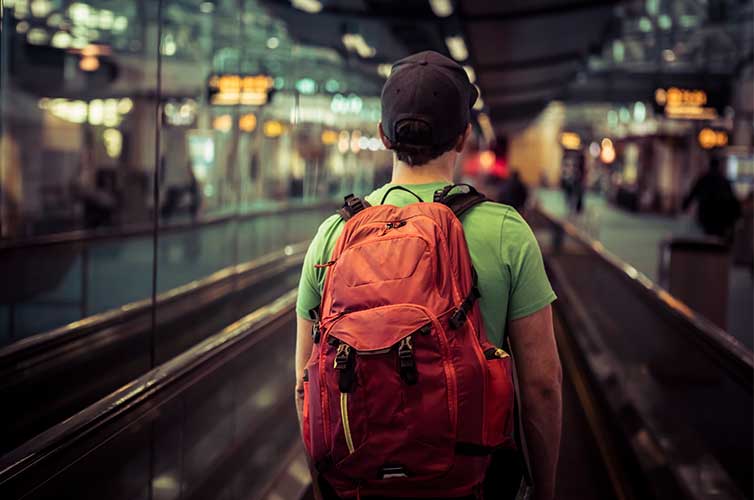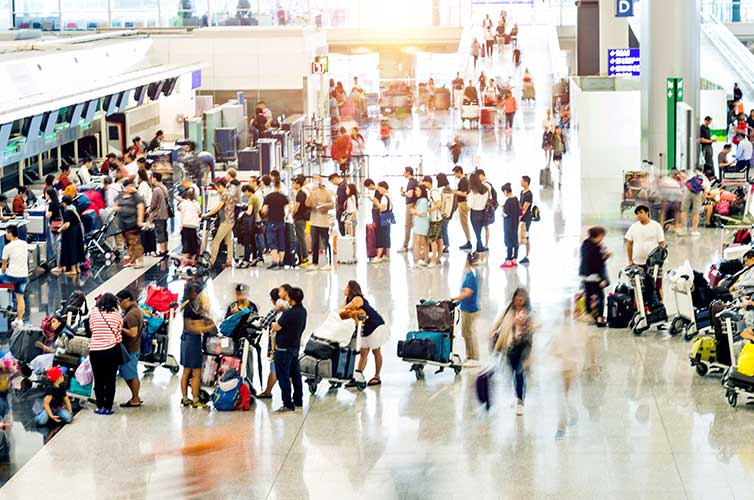Traveling this winter? Like most of us, you probably have plans to travel between November and February, whether you’re flying home for the holidays, back to school for the spring semester or doing something fun, like taking a beach getaway to warm up. Wherever you’re heading, it can be difficult to travel in the winter. Bad weather and crowded airports mean more winter flight delays and cancellations.
So how can you best be prepared for wintertime travels? We’ve got a few travel hacks that may help.
1. Be ready for delays.
During most of the year, you can reasonably expect your flights to operate on time, but during this time of year, you can pretty much expect some winter flight delays. Make your life easier by expecting them in advance and preparing as much as you can for them. Most importantly: check the weather forecast for your travel dates in advance, for both your origin and destination. This can help alert you to any potential obstacles and give you a leg up to prepare for delays or possible cancellations.

Stay up-to-date on alerts and changes for your flight by opting in to text or email updates when you check in online for your flight. You can also check your flight status at any time by simply googling your airline and flight number (i.e. AA 1350 or United 790).
2. Jump the gun and get on an earlier flight if possible.
If your origin or destination is expecting a big storm, try to get out in advance of the storm. Sometimes (sometimes) you can call the airline and see if there’s space on an earlier flight so you can reduce the chance of getting stuck in the storm.
If it’s not possible, make sure you arrive at the airport early and have a backup plan in case your flight is delayed or cancelled. Can you take a train or a bus for shorter trips? Are you able to move your travel plans by a day or two or fly into another airport if necessary? Planning ahead and figuring out potential backup options can help you be prepared in case of a worst-case scenario.
3. Book early morning flights when possible.

No matter the time of year, early morning flights statistically have less delays. Between 6am – 9am, only 11-12% of flights are delayed, but by the time evening flights are arriving (between 7pm – midnight), more than a quarter of all flights are delayed by at least 15 minutes. Delays build up throughout the day, compounding so that later flights are more likely to be delayed.
This is especially true during bad weather, as storms tend to progress and get worse throughout the day, making later flights more likely to get cancelled.
4. Book nonstop flights whenever possible.
The more connections you have, the more chances you have for something to go wrong. This is true any time of the year, of course, but more so this time of year, when bad weather in various cities, overcrowded airports and frequent winter flight delays can stack up and work against you.
5. Know what to do if your flight gets cancelled.

If you’re at the airport: If you’re at the airport and your flight gets cancelled, go immediately to any gate agent or desk employee of the airline you’re flying. Major airlines will have customer service desks, which can be a great resource if they aren’t too busy yet. If they are super busy, any gate agent from your airline will be able to help you rebook. Super busy at the airport? Hop on the phone too and see if someone is able to help you more quickly that way.
Give them your boarding pass and let them know that your flight was cancelled. They should be able to rebook you on the next available flight. In case they can’t, ask about their refund policies in the event of involuntary cancellation.
If you’re not at the airport yet, but your flight is soon: Call the airline right away and ask about rebooking options. Of course, if you’ve purchased your flight through an online travel agency, like ourselves, you can call us as well. Just know we won’t always be able to help you as quickly as the airline can.
If your flight is still several days or weeks away: Contact the airline or the online travel agency you booked your ticket with. They’ll be able to provide you with rebooking options that work for your travel schedule and plans. Keep in mind that you’ll still have to be flexible, of course, but rebooking should be possible.
6. Consider alternate airports
When booking your flights, keep in mind that larger airports will service much more traffic than usual, and definitely more traffic than smaller, regional airports. In places like New York, Los Angeles, San Francisco and other large cities, it may be a good idea to fly into a smaller airport to save yourself some stress and hassle at the airport.
Also, if your flight is cancelled and you need to rebook, let the gate agent know if you’re willing to fly into a different airport than your originally booked itinerary. If you are, it may help them get you on another flight more quickly and/or avoid bad weather in a particular location.
7. Avoid flying on the busiest travel days.

The busiest days:
- The day before Thanksgiving and the Sunday following are the two busiest travel days of the year. Avoid whenever possible.
- For Christmas, the 21st – 23rd are typically the busiest, with the Sunday after Christmas also being quite busy.
- Long weekends (for MLK Day in January and Presidents Day in February) can also be quite busy.
To make your holiday travel easier, just avoid traveling on these days altogether whenever possible. Lines will be longer and the airport (and flights) will be way more crowded. Further, if there are any cancellations, it will be harder to get rebooked (because everything will be much more full).
8. Make your airport experience easier.

With winter travel already being so chaotic, make your life easier by preparing as much as you can before traveling. Place your liquids and laptop in an easy-to-reach spot in your carry-on to make security easier. Don’t keep things in your pockets, which you’ll have to empty before going through security as well. Wear easy slip-off shoes. If you’re bringing gifts in your carry-on or your checked luggage, make sure they’re unwrapped (otherwise, TSA may unwrap them for you to check them during the security screening).
And, most importantly, arrive EARLY. The best thing you can do for yourself when traveling over the holidays is to give yourself plenty of time. That way you won’t miss your flight due to long baggage drop or security lines.
What are your best tips for traveling during the chaotic winter season and handling winter flight delays? Share them with us on social media @studentuniverse!


